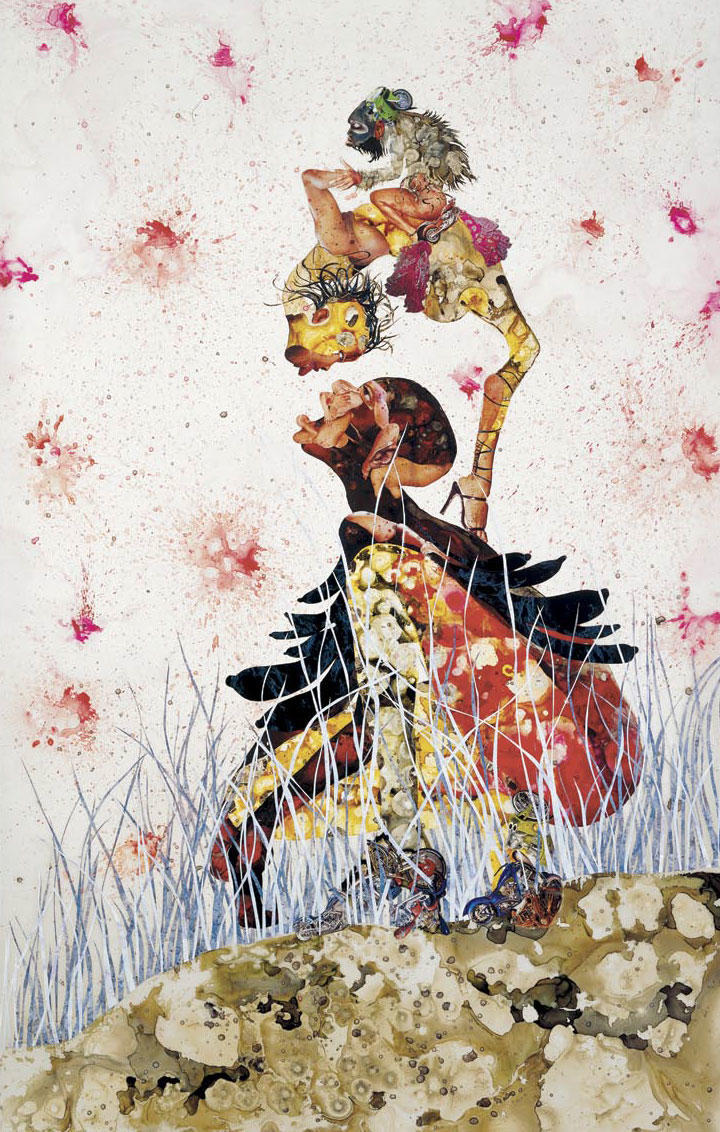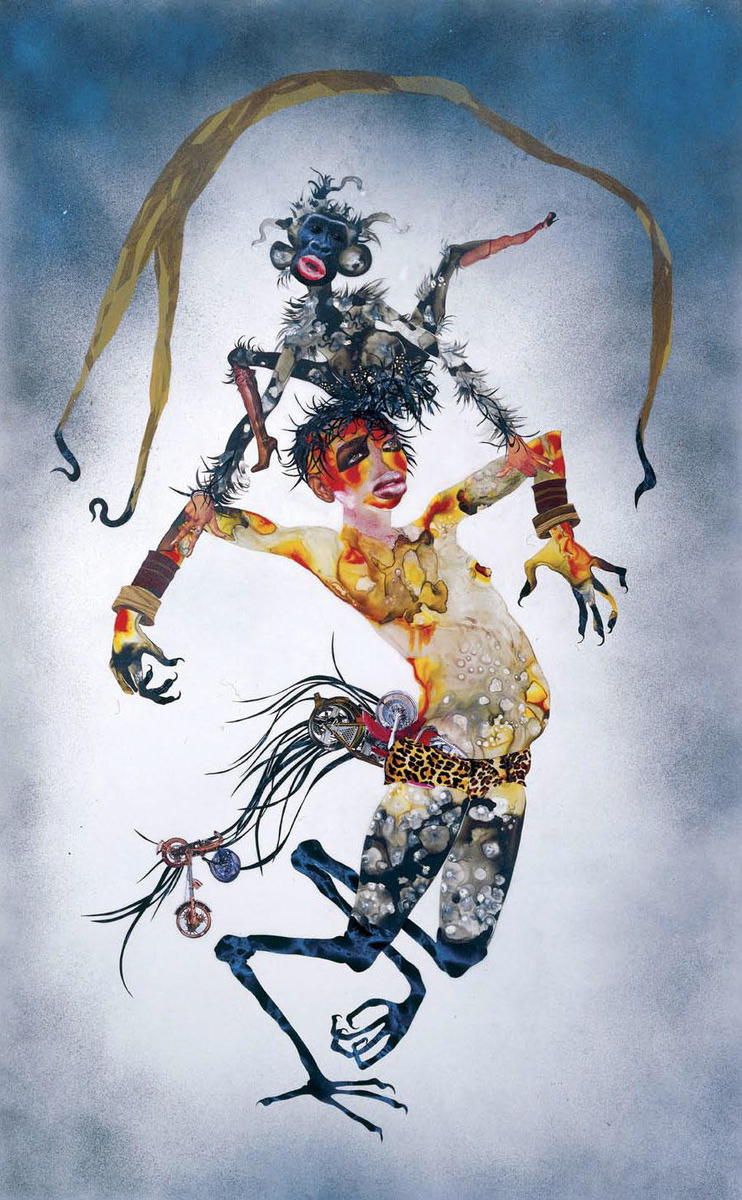
We lived on Fucking Street, the only street in Hargaisa that had a name (or the only memorable one, anyway). Our neighborhood was more orderly than most places in Somalia. The houses were in rows. But, as if to redeem this concession to logic, the numbers weren’t in sequence. Our house was number 117; next door was 82; and the house after that didn’t have a door at all. A crazy old woman called Ardo Balwo lived there, along with her goats, cats, and son, known in the neighborhood as Mohamed Cawar — Mohamed the Cross-eyed. She acquired him as a deposit for unpaid rent for the house across the street, which she let out to the local prostitutes. Mohamed’s birth mother was a prostitute, famous for her big tongue. She had no known name other than Big Tongue.
Mohamed was very loyal to his adoptive mother. She called him Mohamed Gini, after the twenty-shilling guinea note, because he was so precious to her. When someone called him Cawar, she’d respond by sizing up the offender and describing the most private part of their female or male anatomy as “crossed.” (Such abuse was considered inoffensive, quite normal, in Somalia.) In his twenties, Mohamed was still there, sitting slightly apart from Ardo Balwo with a flicker of embarrassment on his face. I don’t know what became of them. When remembering Ardo, Mohamed, and other neighbors of ours, my sister always prefaces her remark with “May they rest in peace,” as it is safer to assume that they have passed away. And if someone died before the war, we add, “So-and-so died, but before dying became commonplace.”
Though Ardo Balwo lacked a door, she did have a doorway. Every night she spent at least an hour carefully placing upright pieces of wood across the entrance — but would readily dismantle her makeshift door to answer any insult to her or her son with her studied reciprocal putdowns.
In the daytime, the doorway stood empty. Each morning she went to the rubbish dump to find things for her house, such as broken glass and burned cans and bits of cloth to tie around herself. She would return around eleven to milk the goats. The animals used to chew khat and we would see them high up on the house or the sole mirimiri tree in the street, enjoying the stimulation and the breeze. She used to pay me one shilling and a half to hold the ears and horns of the goats while she milked them. She then fed the milk to her cats, saving a bit for Mohamed. I looked forward to the payment, though I was ridiculed for it. I spent the money on Coca Cola, the only commodity that was widely available in Somalia, along with God.
Ardo Balwo was rare among Somalis for keeping pets. The only other Somali with a pet cat, to my knowledge, was General Mohamed Hersi, known as the Butcher of Hargaisa because he leveled the city (and worse) before he left. My sister flew out of Hargaisa on the same small Fokker plane as the general, who kept a large panther on a long leash in the hold, allowing it occasionally to snarl into the faces of passengers and the wounded soldiers lying on the floor. It smelled blood, and its agitation made everyone nervous. Hersi enjoyed it. He and his panther occupied the only two seats that hadn’t been ripped out to make space for the medevacs.
Hersi was less than sane, too, in his own special way. We preferred our local crazies. Ardo Balwo may not have had as impressive a cat as the man who destroyed our city shortly after she died, but she made up for that with the sheer quantity of felines that roamed the compound and greeted her as she turned the corner from the marketplace, laden with the lungs and intestines she had bought. Every Somali clan refuses to eat a particular piece of the anatomy of a slaughtered animal, and she would diligently collect these totemic rejects and feed them to her herd. She sat in front of her house, first holding the bits in her mouth, then cutting them into small pieces before carefully feeding her pets.
Many Somalis have nicknames. Ardo Balwo only ever used her own invented nicknames for others. She called my father Garaad, which means “wisdom.” I think he earned this nickname because he was respected, perhaps even feared, by the children in the neighborhood; when my father was around, they didn’t dare mock Ardo Balwo. His name was a reward for those brief respites of politeness. My mother she called Haweye Damakaweyne, which meant “a woman above any other.” My brother Hassan was Miciyo Libaax (Fangs of a Lion), while I was known as Kinsi Garaad, which has no meaning known to the sane. My sister Hodo was Harruuri. Ardo Balwo loved to call out to us with her slightly husky, almost goat-like voice. Harruuri itself had no meaning but was often joined to Hoor Ka Cad, which meant “the one whiter than the foam that forms when milking a sheep or a goat.” (Hodo had pale skin.) “Harruuri!” Ardo Balwo would shout. “Come and have some of this stomach lining; it is very tasty, tasty, tasty, tasty, tasty!” Ardo Balwo was always generous with her food, but it wasn’t appealing to eat the food of a cook who bathed once every two years.

Of all the mad people in our neighborhood — there were more than I can remember — Ardo Balwo stood out as the only one who was a proud homeowner, had a child, and kept domestic (if not quite domesticated) animals. When she was younger, she was quite well off, running an import-export business between Somalia and neighboring countries, of which there were many. The young Ardo Balwo fell for a truck driver famous for his amazing good looks and glowing skin. (She was beautiful herself then.) She referred to him simply as “the glowing one.” Like many truck drivers, he spent his nights in many different places and had lots of admirers across Somalia and probably elsewhere, too. Despite this, Ardo Balwo was happy with him until he cheated her out of her money and abandoned her. She never got over it, and her neighbors found this a logical explanation for her madness. It was commonly understood that unrequited romantic love could make people go insane.
We used to use the mad people as landmarks. For example, Heeryo Busto was the man who used to stand by a particular cafe, always at the same particular time. Then there was the one who used to go the cinema. His name was Rooraaye (The Runner). He’d get there before the film started, usually the only one to arrive on time. The owner would wait until there was enough of a crowd to justify starting the generator. Half of the cinema was covered, half was open to the stars. (On rainy nights, unsheltered seats were cheap.) We watched Indian movies that had no subtitles. Sometimes the reels were even in the right order. Most of the time, while the film was on, the audience would discuss it, only occasionally agreeing. Huge arguments would break out over the subject of the film or the direction of the storyline, and afterward different versions of the plot would be retold. But the best moment for me was right at the beginning, when the national anthem was played. Old men with sticks waved them angrily at the screen and everyone sang the rude version, which translated as, “It’s a big penis with pubic hair, and it fits the queen and whoever else needs it.” Those words suited the music better than the official lyrics, which I cannot remember. The anthem was also played at the end, but no one stayed around that long. Crazy Rooraaye was the first to leave, jumping up and pushing his way through the crowd. That was how he earned his name.
Bisadaaye (Catty) made funny noises but wasn’t violent and didn’t run after children, so he was of little interest to us.
Cumariid used to pray, when he wasn’t swearing at us. We used to call him Cumariid Ina Jibaax — Cumariid, Son of the Wanderer — as he was praying, and he would stand up and instruct his prayer to remain suspended while he turned and abused us in very imaginative ways that usually involved adults engaging in terrible sexual acts. The curses would follow us as long as we were within sight; then he would resume his praying. Cumariid used to stand in the Djibouti Bus Terminal, a grand name for a piece of sand like a soccer pitch.
For us, the best crazy man was Ibrahim, whose insanity took the form of obeying whatever instructions we children would give him. If we told him to run or sing or dance or take his clothes off, he would dutifully do as we asked. He had a crooked grin and a slow wiggly dance that didn’t require him to move his feet. We were told that he had fallen in love with a woman who had bewitched him, and the legacy was plain to see. It was inconceivable that someone could be bewitched in Somalia, so his curse was attributed to foreign parts, most likely Kenya or Ethiopia. Other than taking our orders, Ibrahim never talked. We thought it was the funniest thing. He might have been the only Somali who ever followed instructions.